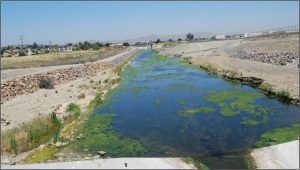SMC study examining why some modified channels are healthier than others

The Southern California Stormwater Monitoring Coalition (SMC) has launched an investigation into why some streams that have been modified via channel hardening have healthier biological communities than others – part of a three-year study examining how to improve the biological health of modified streams while preserving the channel modification features that are crucial for flood protection.
The investigation, launched in December and led by SCCWRP, is working to identify specific factors that influence stream biological health; such insights could pave the way for managers to take informed actions to improve the health of modified channels that are in relatively poor biological health.
In addition to engaging in field sampling work, researchers are analyzing historical monitoring data using the newly developed Rapid Screening Causal Assessment (RSCA) tool, which is designed to rapidly narrow down the likely vs. unlikely causes of degraded biological condition in streams.
More news related to: Bioassessment, Southern California Stormwater Monitoring Coalition